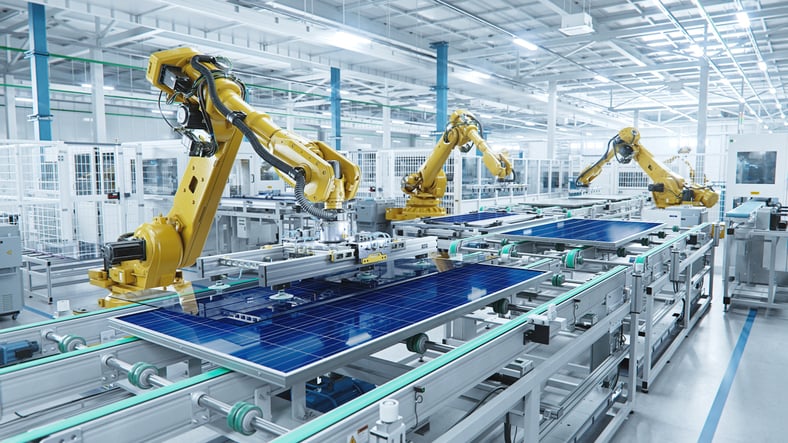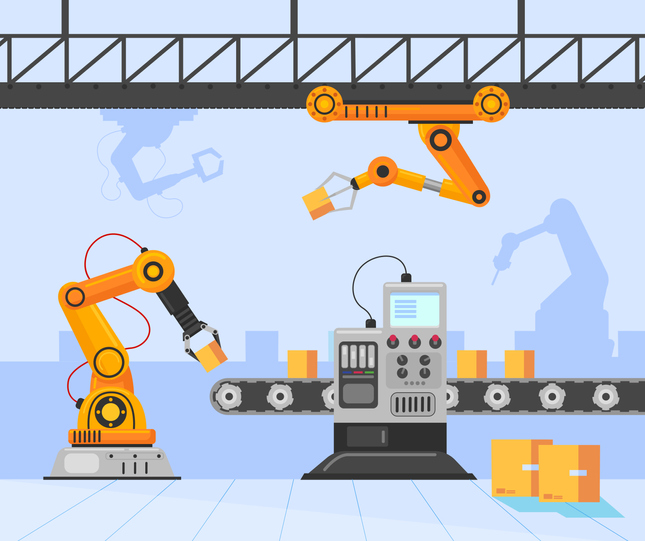In an era defined by technological advancements, industrial robots have emerged as pivotal players, transforming the landscape of manufacturing and production. The global market, valued at over $52 billion in 2023, boasts approximately 3.5 million operational units. As industries increasingly rely on automation for efficiency, production scalability, and enhanced safety, businesses are seeking guidance on choosing from the plethora of industrial robot companies. This comprehensive guide explores the top industrial robot companies, delving into their characteristics, applications, and contributions to the evolving world of robotics.
Characteristics of Industry-Leading Robot Brands
Identifying industry-leading companies involves considering markers such as high annual revenue, decades of experience, ubiquity in specific industries, and innovative contributions. The "Big 4" companies—ABB, Fanuc, KUKA, and Yaskawa—have been at the forefront, commanding roughly 75% of the market. These companies offer diverse solutions, setting the standard for the industry.
Exploring the Top 10 Industrial Robot Companies
ABB
- Capabilities: Arc and spot welding, material handling, sorting, packaging, and quality control.
- Notable: Delta industrial robot for fast picking and packing.
ABB, headquartered in Zurich, Switzerland, stands as a powerhouse in the realm of industrial robotics, offering a vast range of cutting-edge robots that have revolutionized various sectors. ABB's industrial robots showcase unparalleled capabilities, excelling in applications such as material handling, arc and spot welding, quality control, sorting, and packaging. One notable achievement is the introduction of their delta industrial robot, setting new standards for speed and precision in picking and packing lightweight objects. This innovation has found significant applications in industries such as pharmaceuticals, food and beverage, and consumer packaged goods. ABB's commitment to advancing automation technology has positioned them as a leader, with their robots playing a pivotal role in enhancing efficiency and productivity across diverse manufacturing processes.
Comau
- Capabilities: Product assembly, material handling, arc welding and machining.
- Notable: Lower cycle times for programmed tasks by over 25%.
Comau, based in Grugliasco, Italy, has emerged as a prominent player in the industrial robotics landscape, offering a diverse range of robots with versatile applications. Their industrial robots, numbering over 40 in the market, showcase capabilities spanning product assembly, material handling, arc welding and machining. Comau's commitment to innovation is evident in their robots, which have been instrumental in logistics, automotive, and various other industries. Notably, Comau's robots are renowned for their efficiency, as they handle payloads ranging from roughly 6.5 pounds to over 1400 pounds with lower cycle times, exceeding 25% for programmed tasks. This efficiency is a key factor contributing to their widespread adoption in manufacturing processes, emphasizing Comau's significant impact on enhancing production scalability and automation across industries.
Denso Robotics
- Applications: Ultrasonic and laser welding, surface finishing.
- Notable: Suite of four-axis and five-/six-axis robots with varying payload capacities.
Denso Robotics, based in Long Beach, California, has established itself as a leading force in the industrial robotics domain, with 143,000+ and counting of their robots deployed globally. Denso's industrial robots find applications across a spectrum of industries, from aerospace and semiconductors to pharmaceuticals. These robots excel in tasks ranging from Laser and ultrasonic welding to surface finishing, showcasing their adaptability and precision. Denso's suite of four-axis robot arms, capable of handling payloads between 6.5 lbs to 44 lbs, and five- and six-axis robots, capable of handling even larger payloads, demonstrate the company's commitment to providing comprehensive automation solutions. Denso's impact extends beyond manufacturing, as the company itself employs 27,000+ of its robots in various manufacturing facilities, emphasizing their reliability and efficiency in real-world applications.
Doosan Robotics
- Capabilities: Heavy object handling, CNC machine loading, fastening screws, complex tasks.
Doosan Robotics, headquartered in Suwon, South Korea, has carved a niche in the industrial robotics landscape, offering solutions that cater to the demands of busy manufacturing and production facilities. Renowned for their versatility, Doosan's industrial robots showcase the ability to maneuver and stack heavy objects, making them invaluable in dynamic industrial settings. These robots excel in tasks such as loading and unloading CNC machines, fastening nuts, bolts and screws for assembly processes, and undertaking complex operations requiring human-like precision. Here is a recent video from CES of a Doosan Robot making cocktails. Doosan Robotics' commitment to providing robots capable of diverse and demanding tasks positions them as key contributors to automation in the manufacturing sector.
Epson America, Inc
- Robot Types: SCARA and six-axis robots.
- Notable: G3-Series SCARA robots used by Taylor Guitars for increased production.
Epson America Inc., headquartered in Suwa, Japan, extends its influence beyond the well-known realm of desktop printers, emerging as a significant player in the industrial robotics sector. With a history dating back to 1942, Epson has leveraged its expertise to develop a robust line of industrial SCARA and six-axis robots. Boasting 300+ models of SCARA robots, Epson's legacy in industrial automation is evident. These robots, with a reach ranging from 175 millimeters to 1000 millimeters, have been pivotal in various applications, from assembling Seiko watches over 35 years ago to aiding Taylor Guitars, in increasing production of acoustic pickups from 10 to 20 units a day to 100 units per day, and then up to 600 units per day today.
Here is the video...
Additionally, Epson's six-axis industrial robots, featuring a distinctive "folding arm" design, enhance motion and efficiency, making them instrumental in addressing the evolving needs of manufacturing industries worldwide. Epson's commitment to quality and innovation positions them as a key contributor to advancements in industrial automation.
Fanuc
- Applications: Assembling, picking-and-placing, quality control, packaging.
- Notable: Industrial painting and coating robots used by top automakers.
Fanuc, headquartered in Yamanashi, Japan, stands as a distinguished leader in the field of industrial robotics, specializing in manufacturing robots that cater to a diverse range of industries. Recognizable by their bright yellow color, Fanuc's industrial robots are renowned for their efficiency and speed. The company's SCARA robots, with payloads ranging from approximately 6.5 lbs to 45 lbs, excel in performing precise picking-and-placing actions, assembling products, quality control, as well as packaging, particularly in the automotive and medical device industries. Fanuc's industrial coating and painting robots have made a significant impact, being utilized by the world's top automakers. The company's commitment to innovation and high-performance robots has positioned them as a key player in advancing automation technologies, contributing to enhanced productivity and efficiency in manufacturing processes globally.
Franka Emika
- Applications: Feeding and unloading press brakes, electronics assembly.
- Notable: Franka Production 3 with human arm-like dexterity.
Franka Emika, headquartered in Munich, Germany, has made significant strides in the realm of industrial robotics, offering innovative solutions for manufacturing and production processes. At the forefront of automation, Franka Emika's industrial robots, including their latest model, Franka Production 3, redefine human-robot collaboration with seven axes and 100+ sensors. This level of sophistication grants these robots dexterity like a human arm particularly beneficial in assembly operations. What sets Franka Emika apart is not only their technological prowess but also their commitment to user-friendly interfaces. Workers can operate the Franka Production 3 without coding knowledge, marking a significant step towards accessibility in the field of industrial robotics. The company's dedication to providing advanced, yet easily operable robots positions them as key contributors to the evolution of automation in manufacturing industries.
Hanwha Corporation/Momentum
- Industries: Automotive, pharmaceutical, food, cosmetics.
- Applications: Parts manufacturing, assembly, quality control, packing.
Hanwha Corporation, operating from Seongnam, South Korea, has established itself as a prominent player in the industrial robotics sector, with a diverse range of applications across various industries. Their industrial robots, designed for versatility, find application in many industries like pharmaceuticals, automotive, and others. In the automotive sector, Hanwha's robots play crucial roles in manufacturing parts, assembly, and the quality control process, showcasing their adaptability to different stages of the production process. Moreover, in sectors such as pharmaceuticals, cosmetics, and food, Hanwha's robots excel in tasks like packing, loading, and precise pick-and-place actions. The company's commitment to providing robotic solutions for a wide range of applications underscores their significance in enhancing automation and efficiency across different industrial domains.
Kawada Robotics Group
- Robot: Nextage (Dual-arm)
- Notable: Works alongside humans, built-in image recognition, 15 axes.
Kawada Robotics Group, headquartered in Tokyo, Japan, has made notable contributions to the industrial robotics landscape, particularly with their dual-arm industrial robot known as Nextage. This innovative robot demonstrates a remarkable ability to collaborate with humans in diverse manufacturing settings. Equipped with its own image recognition capabilities and featuring 15 axes with an electromagnetic brake system on its elbows and shoulders, Nextage stands out for its capacity to recognize and respond to its environment, ensuring safety and precision. With a maximum payload of 3.5 pounds when utilizing both arms, Nextage proves versatile in various applications, showcasing its effectiveness in tasks that require human-like dexterity and adaptability. Kawada Robotics Group's commitment to advanced robotic solutions positions them as key players in the evolution of human-robot collaboration in manufacturing industries.
Kawasaki Robotics
- Payload Capacity: Up to 3,300 pounds
- Applications: Sealant and adhesive application, silicon wafer transfer.
Kawasaki Robotics, based in Tokyo, Japan, has emerged as a prominent force in the industrial robotics domain, offering a diverse range of robots with applications across various industries. Renowned for more than just jet skis and motorcycles, Kawasaki's industrial robot division produces robot arms capable of handling payloads up to 3,300 pounds. These versatile robots find utility in a wide array of applications. Notably, Kawasaki's industrial robots have been instrumental in manufacturing processes, such as assisting in the assembly of walls used in prefabricated homes, as demonstrated by collaborations with companies like Rehkemper & Son. The company's commitment to innovation and adaptability in their robotic solutions underscores their significance in driving efficiency and automation in diverse industrial applications.
Other Leading Industrial Robotics Companies
While the top 10 industrial robotics companies dominate the market, there are noteworthy players beyond this list that contribute significantly to the evolution of automation. Kinova Robotics, with its focus on ultra-small and high-speed robots, stands out for its efficiency in pick-and-place tasks and lab automation. KUKA, a German powerhouse, extends its influence across various industries, showcasing adaptability even in ultra-clean room environments and radioactive settings. Mitsubishi Electric Automation, Inc., based in Illinois, proves its versatility through applications ranging from apple packaging to solar assembly. Omron Group, a Japanese giant, excels in providing comprehensive solutions with its SCARA and articulated robots. STÄUBLI, hailing from Switzerland, boasts precision and speed in high-speed assembly and aseptic environments. Yaskawa, with a rich history, continues to be a mechatronics leader with its MOTOMAN robots. As you explore the industrial robotics landscape, these companies outside the top 10 emerge as vital contributors, each bringing unique strengths to the realm of automation and manufacturing.
Navigating the Robotic Landscape
As industrial robots continue to redefine manufacturing processes, businesses face the crucial task of selecting the right partner. The diverse applications and capabilities of these top 10 industrial robot companies offer a spectrum of solutions for various industries. The importance of aligning robots with specific industry needs cannot be overstated. Whether it's ABB's precision welding or Fanuc's high-speed assembly, each company brings unique contributions to the realm of industrial robotics. Platforms like RoboDK further simplify the integration process, ensuring universal support for the robots produced by these industry leaders. In a world increasingly shaped by automation, the journey through the robotic landscape promises continued innovation and efficiency.
Visigistics stands as a valuable partner for companies seeking to navigate the complex landscape of industrial robotics, offering comprehensive assistance in the design, selection, and implementation of cutting-edge robotic solutions. Leveraging their expertise, Visigistics aids businesses in crafting tailored strategies that align with their unique operational needs and goals. With Visigistics as a partner, companies can confidently embrace the transformative power of industrial robotics, propelling their operations into the future with precision and innovation. Contact us today to discuss your industrial robotics needs.
Frequently Asked Questions:
How does the rise of automation affect manufacturing in Mexico for US companies?
The increase in automation within the U.S. manufacturing sector has considerable implications for manufacturing operations in Mexico, particularly for companies based in the United States. As American companies enhance their productivity through robotics, they often reduce the number of workers required domestically. This shift can lead to a cascade of effects on neighboring economies, including Mexico's, where a significant portion of manufacturing related to U.S. businesses takes place.
When U.S. companies automate their manufacturing processes, the consequent improvements in efficiency and productivity can alter their reliance on Mexican manufacturing facilities. For example, the increased use of robots in the U.S. might decrease the cost-benefit of outsourcing to Mexico, where labor costs have traditionally been lower. American companies could opt to reinvest in more technologically advanced facilities domestically rather than expand or maintain operations abroad.
However, this shift also presents opportunities for Mexico's manufacturing sector. To stay competitive and integrated with U.S. manufacturing, Mexican operations might need to adopt similar advancements in technology. This could spur a wave of technological and educational development within Mexico as the workforce seeks to adapt to the new industrial requirements, potentially leading to a more skilled labor force and advanced manufacturing capabilities within Mexico itself.
This change would also necessitate a more robust educational framework in Mexico, focusing on electronics, automation, and robotics - fields that are essential to the new landscape of global manufacturing. Strengthening these areas could help offset potential job losses due to increased automation in the U.S. and keep Mexican manufacturing competitive and relevant.
Are robots taking away jobs while improving overall standard of living?
In an article published by the Wall Street Journal two years ago, MIT economics professor David Autor was highlighted for his insights on the impact of robotics on employment. Contrary to the popular belief that robots are replacing human workers, Autor suggests that this is not necessarily the case. He notes that countries like Germany, which employ significantly more robots per hour of human labor than the US, have not seen a corresponding decrease in manufacturing jobs. Additionally, he points out that with the increase in automation, there has been a rise in productivity and Gross Domestic Product (GDP), suggesting a potential improvement in the overall standard of living. However, the exact relationship between increased automation, job availability, and economic prosperity remains complex and not fully understood, indicating that the issue is more nuanced than often portrayed in simplistic political debates.
How is manufacturing in Mexico being affected by robots?
Manufacturing in Mexico has seen significant shifts due to advancements in automation. While some attribute the decrease in U.S. manufacturing jobs to international trade, particularly with Mexico and China, a growing body of research suggests that automation might play a more substantial role. Studies, including those from Ball State University, reveal that in the U.S., robots have dramatically enhanced productivity. For example, between 1998 and 2012, productivity across all sectors surged by 32% due to automation. This increase in efficiency means that fewer workers are needed; a comparison of workforce requirements in 2000 versus 2010 indicated that the same output could be achieved with 8.8 million fewer workers because of robotic technologies. This trend of replacing human labor with machines is not confined to the U.S. and is likely impacting manufacturing practices in Mexico similarly, leading to fewer jobs as robots take on roles that were previously filled by people.





